

|
Back to |
| The Front Page |
| People |
|
A courtside chat with Danny Huneycutt and Ben Rothman |
||||||||||||
|
by Bob Alman photos by Dylan Goodwin and Joe Perotti Posted November 9, 2013
|
||||||||||||
|
||||||||||||
In our 2008 interview, Ben Rothman told me he'd like to win some championships. By the fall of 2013, five years later, he had won fifteen USCA championships, more than any other player in the history of the American sport. He described how he had decided to become a croquet pro--to "follow his passion"--and then became the pro at Mission Hills in California. At the end of that interview, I predicted he'd be a finalist in a world championship soon--and it happened the next year, when at the National Croquet Center he lost the finals to Reg Bamford. In the meantime, Danny Huneycutt took an early retirement and embarked on what would become almost a fulltime croquet career of his own, culminating in a recent hire at Johns Island in Florida. These two great players are friendly and fierce competitors and sturdy anchors of USCA contingent going to Christchurch in December 2013 to compete against the teams of England, Australia, and New Zealand. They generously made time in a packed schedule of play for our interview on the veranda of the National Croquet Center during the USCA Selection Eights.
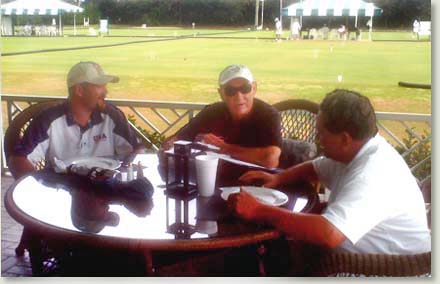
|
| Ben Rothman, Bob Alman, and Danny Huneycutt make time to talk at a corner table over lunch on the veranda of the National Croquet Center during the USCA Selection Eights. Photo by Joe Perotti. |
BOB ALMAN: I'm sitting on the veranda of the National Croquet Center during the Selection Eights in October 2013 with the first two players in America to achieve a minus four and a half USCA handicap. Who got there first?
DANNY: I was first, last year I think.
BOB: And Ben followed soon after....
BEN: ...After winning the USCA Western Regional last year. The Mission Hills Invitational and the Regionals are the only two American Rules tournaments I competed in last year, other than the National Championships.
BOB: I pointed out to Bob Kroeger that the negative handicap bias was just going to continue, and you're both going to go to minus eight by 2020, and he said, "Yes, but without the adjustment, they'd be there a lot sooner." But that's American Rules. What I would really like to know is: When are you guys going to start doing sextuples in major competition in Association Croquet?
BEN: We tried sextuples in 2011 and know how to do them, but executing them reliably in competition is another matter.
BOB: Let's say on easy courts, are sextuples worth it for you...yet?
BEN: No, not yet. I'd have to have a 65 percent probability against a strong opponent to embark on a sextuple on an easy court. One mistake can be--probably would be--fatal. So it would have to be at least 65 percent.
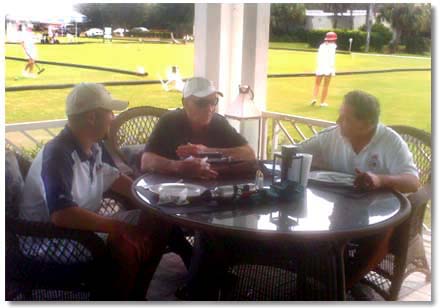
|
BOB: Maybe at your level the USCA handicap doesn't matter very much, except as a ranking. Theoretically, the Grand Prix could balance the inequity of the handicap system, because it awards points if you just show up. Even with the "correction" of the USCA handicap system, it's still designed to slide downward, and I don't think anything can be done about that, given the historical culture of the USCA. People don't want to lose the handicap they use as a ranking, as a kind of status symbol.
BEN: Handicaps don't really work very well as rankings. There aren't many handicap tournaments in America. I think there's one at Stone Ridge. We really don't use handicaps in tournament play...
BOB: They're used to divide flights...
DANNY: We don't use handicaps as a development tool, and we should. We should use them to match up players of different strengths so they both have an equal chance to win. But that doesn't happen much.
|
BEN ROTHMAN
DANNY HUNEYCUTT
|
DANNY: Not a "virtual pro" any more. I have a real job now, at Johns Island [on central Florida's east coast] beginning in January, after I get back from New Zealand for the MacRob.
BOB: What about the family?
DANNY: They're very supportive. Because I have no intention of getting a year-round fulltime job.
BOB: Is your wife coming down?
DANNY: No, I'm renting, I'm not starting until January, and working only 'til mid-May. I already make four or five trips to Florida in the winter season. My wife won't come down, because she's an accountant and it's her busiest time of year, but I'll go back and forth a couple of times.
BOB: How about the handicap tournaments? You have the power. Will you do that?
DANNY: At John's Island, I believe we can do that, because we're going in fresh. At a bigger club, most of the handicaps are evenly distributed, but at John's Island the skill levels are all over the place, in the high range, and they could really benefit from some handicap play.
BOB: Ben, what can you do at Mission Hills?
BEN: Some years ago we changed the Pat Apple Tournament--named for the founder of the club--from American to Association, and that's a handicap tournament. But we don't have any American Rules handicap tournaments. We have a very tight tournament schedule as it is. We have about 9 to 12 tournaments in our season. The USCA Regional doesn't have to be there any more, it could move around. One of the great things about the USCA is that the regionals CAN move around, they're not wedded to one venue.
BOB: But there's a good reason to have the big tournaments there, like the nationals, because of the big player base, and because there are not that many venues with as many lawns as you have there. How many?
BEN: Seven full-time lawns for croquet; and we can expand to three or four more, using the grass tennis courts. And we do have the regional Vice-President there, Ron Hendry, and lots of players, so in a way it makes sense for the USCA to want us to host the regionals, but I think it needs to move around more.
BOB: Danny, at John's Island, isn't it pretty much an East Coast-style American Rules culture?
DANNY: It's about half and half, American Rules and Golf Croquet.
BOB: No Association play at all. Could you comfortably put your 12 or so American Rules players into one handicap flight?
DANNY: I could evaluate it. There's a really good chance that I will.
BEN: One advantage for Mission Hills as a large club is that we can have a club tournament and have eight people in each of many flights that are within a handicap point of each other, and have them all be competitive. At John's Island, the best way to get his twelve players competing is in a handicap tournament.
BOB: So let's talk about development, Danny. Describe your Johns Island development program with the limited pool of players you have.
DANNY: Well, my first day on the job is December 9. And that will be a time to evaluate what comes next, what the club is and what the administration wants, so I can have a plan of attack on the croquet program when I begin full-time in January.
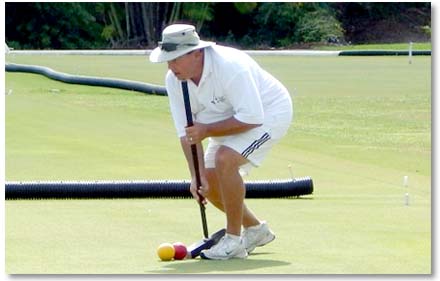
|
| Danny Huneycutt prepares for a roll shot in the USCA Selection Eights. Photo by Dylan Goodwin. |
BOB: But right now, just blue-skying, where would you like the Johns Island program be in three or four years?
DANNY: I would love to see 12 to 15 tournament players and 24 to 30 American Rules players in all. That's what I'll work towards. I'd like to see anywhere from 60 to 100 people participating at some level in Golf Croquet, so we can get the point where we can host Golf Croquet, American Rules, and Association Croquet tournaments. I'll test the waters later in the year. We'll put on some sort of tournament, aimed at bringing other people in, and show the rest of the croquet world that Johns Island Croquet Club knows how to host a real tournament.
BOB: Well, that's very ambitious, isn't it, 100 people, with--how many people are living in the development?
DANNY: There are 1308 households.
BOB: Ben, how does that percentage compare with your situation at Mission Hills?
BEN: Well, considering that we have members all over the Coachella Valley, it's hard to limit it to the 1,000 families just at Mission Hills. It's hard to compare, but I'd agree with Danny that we'd like to see our players become more versatile. Maybe 90 percent of the players who predominantly play Association or American Rules also play other games. And yet we have a lot of our people playing Golf Croquet who haven't touched on the other games yet. So our president, Mary Rodeberg, is wanting to get those people eased into the other games, playing croquet strokes in high-low doubles, and having clinics to get new players....
BOB: But no pressure. When I was out there two years ago, Ben, there was some talk around the courts about Golf Croquet players "taking over" the facility. Is that still going on?
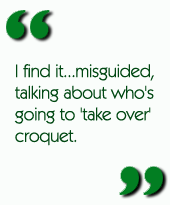 BEN: I find it a little misguided, talking about who's going to "take over" croquet.
BEN: I find it a little misguided, talking about who's going to "take over" croquet.
BOB: It is, it is, I agree. But that's the talk I heard.
BEN: If we get 5,000 new players, I don't care what version of croquet they play, that's good for the sport.
DANNY: I want all the social players we can get. What I always tell everybody is, "Don't miss out on the social relationships of the people who play croquet."
BEN: I know a player who has a one-court club who says the more social players who pay their dues, who don't necessarily come out a lot, the better. If you have 20 people who come out maybe once a month, they're paying dues and so your club has a bigger reservoir of financial resources to further build the club, you're not going to be over-taxed for lawn use, and you'll have more funds to throw social events for everyone. The sport has sometimes bordered on exclusionary, with a high price to join certain clubs and play, but there are great clubs in North Carolina that really don't cost very much. You don't have to pay a thousand dollars to join. I don't know what your dues are, Danny....
DANNY: $100 dollars, or $150 a couple.
BEN: Okay, so if they all want to play Golf Croquet, then I don't think the American Rules players will have that hard a time in reserving space to play their game or Association croquet, and we'll have more courts and more court time for everyone. It will just result in more clubs, more lawns, more facilities, and further popularizing the sport. You get a couple of hundred or a couple of thousand more players, some of them are bound to want to play the other games as well.
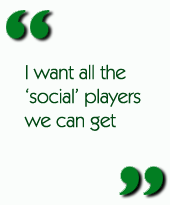 BOB: Ben, achieved the finalist position in a WCF world championship, in 2009, losing in three rather unimpressive games then against Reg Bamford. How would you handle such an opportunity now....and how would you feel--either of you--about playing against Robert Fletcher, who beat Bamford this summer in England in three straight? And in fact, you WILL play against Fletcher in Christchurch in January upcoming, so surely you've asked yourselves whether he's really the best croquet player of all time. Is he?
BOB: Ben, achieved the finalist position in a WCF world championship, in 2009, losing in three rather unimpressive games then against Reg Bamford. How would you handle such an opportunity now....and how would you feel--either of you--about playing against Robert Fletcher, who beat Bamford this summer in England in three straight? And in fact, you WILL play against Fletcher in Christchurch in January upcoming, so surely you've asked yourselves whether he's really the best croquet player of all time. Is he?
BEN: I think I would handle the world championships differently now, having had the experience to steady myself in big competitions like team events and national championships. Both Danny and I have beaten young Robert before and while he is an amazing talent, I don't think he's made a case for "best player of all time" yet. We will do our best to beat him in the Mac because every point counts.
BOB: In that same interview, you said corporate croquet was the way to go for any good club, and you mentioned that Peter Just was promoting just the right idea--having a CORPORATE LEAGUE as an intermediate step between fun, knock-around golf croquet and the "serious" play they see members doing. As it happens, the National Croquet Club has adopted that policy, which also includes an inexpensive first-year and intensive courses in that first year to bring them along. Whether or how well it's working long-term is yet to be seen because we're still in the yearly renewal effort. Are you doing anything like that at Mission Hills?
BEN: We haven't ventured into many outside events at Mission Hills in my time there. I still think that model can be used, but our population in the Coachella Valley is a bit different from San Francisco or New York or even West Palm Beach. I wish you the best of luck.
BOB: Now that it's been proven, conclusively, that a single player can excel in both Association and Golf Croquet, let's talk a little about the differences and the similarities. I'm assuming you use the same mallet for both games--even though Egyptian players use a lighter mallet to get a faster swing and a more controlled stun shot. So let's talk about the shots: Are there particular shots that you practice just for Golf Croquet?
BEN: I use the same mallet for all versions of the game. As Ron Hendry likes to say, "it's the Indian, not the arrow." The more comfortable and practiced you are with your mallet, the more you can do. The specific Golf Croquet shots I like to prepare for are jump shots and long hoop shots. The jumps become critical at the top level for hoops and even some clearances. Long hoop shots are rare in other versions, so I like to be ready for a seven-yard hoop shot in Golf Croquet, because I almost never have to try that in American Rules or Association Croquet.
BOB: In AC, the various openings, leaves and breaks that can produce a "perfect" game for the winner can leave little or no interaction between the players, but Golf Croquet is designed, necessarily, as an interactive game, with only one stroke per turn throughout. So winning seems more a reaction to whatever the opponent does than just devising a particular strategy you can stick with throughout. Maybe I'm talking about a style or a game personality, in Golf Croquet. Is your personality the same or different for the two games?
BEN: I get more chatty in Golf Croquet because both players (or all four) are on the court at once. Golf Croquet can provide bigger adrenaline rushes and thus requires more self control (something I'm working on). I have some reliable tactics in Golf Croquet just like AC when I know exactly where I'm going to position the shots based on fairly accurate estimations of what my opponent will do next. So, in that way, the mindsets can be very similar; it's just the execution that varies a bit more in Golf Croquet, so you must reassess quite often.
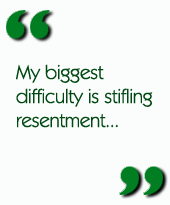
BOB: Accidents are inevitable in any game, and especially consequential in a tight game of Golf Croquet. Eric Sawyer has told me of being subjected to the Orgill Special--in which Mike hits a jawsed ball such that it runs the next hoop in order. That has happened to Eric and it depressed him. So the question that comes out of this is whether you ever get depressed by the accidents in the game and whether you have a technique for handling that--that is, for managing your own mind?
BEN: In that case, Mike hit the ball too hard and over-rolled position. Errors happen and sometimes an opponent's error in judgement or execution works to their benefit, thanks to dumb luck. My biggest difficulty is stifling resentment. I don't mind being beaten by good play, but watching an opponent luck their way past you can be depressing, as Eric says. In this aspect, Duncan Dixon (of New Zealand) is the best croquet player in the world. His affect at the World Team Championships in South Africa was unshakable. While he may have been raging inside, he maintained the calm exterior of a champion poker player and he never seemed to be rattled by the outcome of the shots. He just moved on to the next one and executed.
BOB: Let's talk about the two codes, American Rules and Association. You and Danny are top-level players, you want to compete internationally, you want the US to excel, and to do that you have to play Association Croquet like the rest of the world. So, how does that come down to development in your local club?
BEN: Well, based on the number of players we have, I'd say 50 percent are Golf Croquet, and the other 50 percent are divided between Association and American Rules in their preference.
DANNY: At Johns Island, lots of people play Golf Croquet now, so I'd say it's 50/50. No Association play, yet.
BOB: I'm getting the idea that all of us here favor Golf Croquet as the main way forward to expanding croquet's popularity both within the USCA and in the broader culture. Right? How can that be accelerated?
BEN: We can have more Golf Croquet tournaments. The NCC club president John Warlick has hosted a Florida Regional Golf Croquet tournament here, and that could be done in the other regions. And that would give us a bigger bank of data to go by to rank all the USCA members who play Golf Croquet--which would provide expanded momentum. So more local tournaments could lead to regionals.
DANNY: Which would give Golf Croquet players a reason to join the USCA national organization--more than just local "Wine and Wickets" events inside the club. I can promise you that you're going to see a Golf Croquet tournament open to all USCA members at Johns Island this next season, and maybe two for the following season. This is especially relevant to the younger, professional people we have. They have another life, they're not all retired. They're not going to go out there every day, but if we have tournaments--maybe not long tournaments, but serious competition--they're going to prepare. I've found out there are a couple of small clubs nearby, so I'm going to encourage more inter-club competition, too.
BEN: And you can run a Golf Croquet tournament in a shorter period of time, so that works for younger working people, too. You can do a weekend tournament with many more games of Golf Croquet than Association or American Rules. So with Golf Croquet, we have a chance to encourage more people, and more YOUNGER people to play croquet.
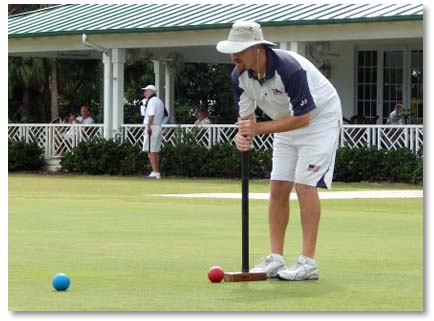
|
| Ben Rothman plays a break on Court Seven at the National Croquet Center in the USCA Selection Eights. This annual tournament is modeled on the high-level events England, Australia, and New Zealand use to train top players and evaluate them for selection in their international teams. This year there were five "eights" ranked, with few exceptions, according to their current international grades. The event is played as a double round robin of Association Croquet, 14 games over four days, with no time limits in the top groups. Photo by Dylan Goodwin |
BOB: Could you do a Golf Croquet Regional for the Western Region at Mission Hills?
BEN: Yes, although we already have a busy tournament schedule, and one aspect of the players culture there is that they don't enjoy having a tournament every week, or even every other week.
BOB: Sounds like a chance to get the San Francisco Croquet Club revived--maybe in Golden Gate Park. That would be a good central location for a regional. But for the immediate future, we'll see the USCA international team head to New Zealand for the MacRobertson Shield, beginning December 31 in Christchurch. That event needs to get supported...
BEN: And we do get good support--a portion of every USCA member's dues goes to the Lee Olson fund, dedicated to supporting the International Team. USCA members are able to donate more on top of that, and they do. There are a lot of international events, including the Solomon, the World Championship, the international team events for both Association and Golf Croquet. The USCA is able to support the team events, and the money goes to the entire team, not just to one person or another, for the travel expenses for the team. So it enables us to have top players for those events who not only have the time off, but also have some financial support for very expensive travel.
BOB: Haven't I heard complaints that the fund doesn't cover enough?
BEN: I believe everybody had 80 or 90 percent of their travel and accommodation paid for in the Solomon against England.
BOB: But it's still a significant personal expense for the players...
BEN: Yes, and there are players taking on extra jobs just to make sure they can cover all their personal expenses. You probably noticed that not many of our top players went to the world championships this summer, just across the Atlantic, and the reasons were that it takes a lot of time off work, and also that it's too expensive, so they had to save time and money for the more important team presence, when the best players the USCA can assemble get to compete against the best of England, New Zealand, and Australia.
BOB: It's a huge personal commitment.
BEN: But not nearly as much as in the 30's and 40's, when the only players who could compete in New Zealand and Australia had to take a boat or several boats to get there, and probably a couple of months at least in time, just to compete. Very expensive, very time-consuming. But today, playing the MacRob in New Zealand is only a three-week commitment, still huge for somebody who has a nine-to-five job.
BOB: Ben, Jim Butts put out an excellent press release ballyhooing your chances of achieving the first "triple crown" of American croquet singles championship--if you win the American Rules 2013 title at Mission Hills. Are you fairly confident?
BEN: I enter every tournament with the goal and mindset that I can win it and will try my best to win, so confidence is there. Danny's playing in this year's nationals, so he is definitely on my radar along with Jeff and Doug and Rich and Brian. Many champions are in the field, so it's difficult to expect much when there's so much talent to conquer.
When I was able to win the AC singles in April here at the NCC I felt that I had achieved a unique feat, holding held all six titles at once--singles and doubles in Association, American, and Golf Croquet. Since then I repeated as the GC champion in singles, while Sherif and I won the doubles again and Doug and I (eventually) got our fourth AC doubles title together. That makes nine national titles in a row-- so I don't really understand why people are concerned with me winning three singles titles in one calendar year when I feel that what I've already accomplished is a bit more impressive. I'll still try my best, of course.
BOB: When you beat Danny in the finals of the last national championships here, I wrote that Danny was the tournament director, and thus had a good excuse for losing to you. At Mission Hills in December, that situation will be reversed. So I give you permission to end your streak, Ben, at your own venue, and give Danny the win. And yes, I agree it would be highly presumptuous to assume that you two will be the finalists again. But given even odds, I'd bet on it. Good luck to you both--at Mission Hills in the Nationals, and especially with the USCA team in Christchurch!